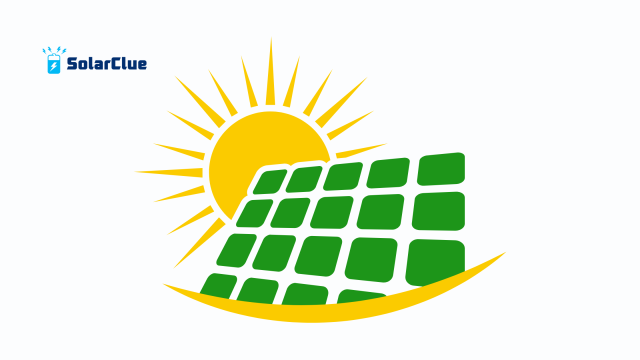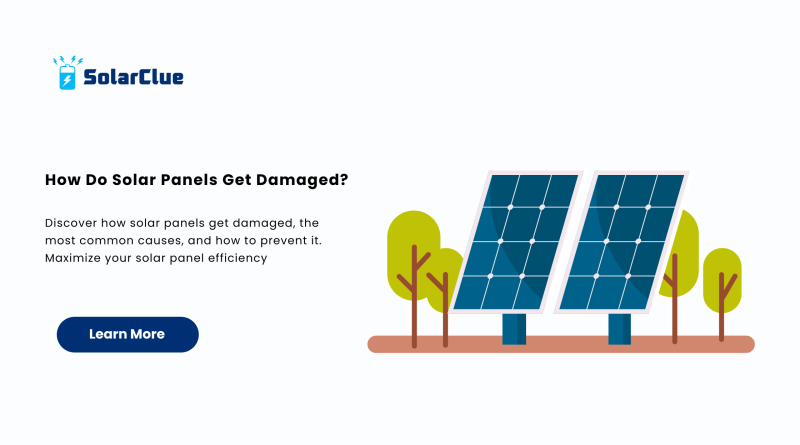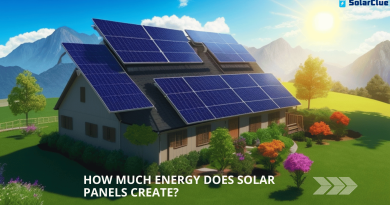How Do Solar Panels Get Damaged?
Solar panels are a reliable and sustainable way to harness solar energy for your home or business. But like any other technology, they are not immune to wear, environmental impacts, or improper maintenance. This comprehensive guide explains exactly how solar panels get damaged, how to prevent these issues, and what to do if it happens.
Table of Contents
- 1 1. Weather-Related Damage
- 2 2. Poor Installation Practices
- 3 3. Debris and Dirt Accumulation
- 4 4. Manufacturing Defects
- 5 5. Thermal Stress
- 6 6. Animal Interference
- 7 7. Age and Wear Over Time
- 8 8. Electrical Surges and Lightning
- 9 9. Human Error and Vandalism
- 10 10. Moisture and Water Ingress
- 11 11. Shading Issues
- 12 12. Lack of Maintenance
- 13 13. Using Substandard Equipment
- 14 14. Inverter and Battery Issues
- 15 15. How to Prevent Solar Panel Damage
- 16 Conclusion
- 17 FAQs
1. Weather-Related Damage
Hailstorms and Heavy Rain
Severe weather like hail can physically crack or dent solar panel surfaces. While most modern best solar panels are built to withstand impact, frequent or extreme storms can weaken protective layers over time.
Wind Damage
Strong winds can loosen mounting systems, shift the panels, or break panel frames if not securely installed. Ensuring proper anchoring can prevent wind-related issues.
2. Poor Installation Practices
Inadequate Mounting
Improperly mounted solar panels can lead to panel shifting, breakage, or even detachment. Always rely on certified professionals to install the best solar panel for home.
Wiring Mistakes
Incorrect wiring may result in short circuits, overheating, and power inefficiency. Faulty connections may also become a fire hazard over time.
3. Debris and Dirt Accumulation
Tree Branches and Leaves
Branches falling or resting on panels can scratch surfaces or block sunlight, reducing solar panel efficiency.
Dust and Pollution
Accumulated dirt, especially in urban or dry areas, can significantly reduce solar panel benefits by limiting sunlight exposure.
4. Manufacturing Defects
Microcracks
During manufacturing or transportation, microcracks can form in the silicon cells. These small fissures grow over time, compromising panel integrity and reducing output.
Delamination
This happens when layers of the panel begin to separate due to poor adhesion, moisture ingress, or UV exposure. It affects performance and lifespan.
5. Thermal Stress
Heat Expansion and Contraction
Daily temperature changes cause materials to expand and contract, leading to stress fractures or sealant degradation in panels.
Hotspots
Hotspots develop when part of a panel operates hotter than the rest due to shading, soiling, or cell mismatch, reducing overall efficiency.
6. Animal Interference
Nesting and Chewing
Birds, squirrels, and other small animals may nest under panels or chew on wires. This causes both performance and safety issues for your solar power system.
7. Age and Wear Over Time
Natural Degradation
Even the best solar panel experiences a decline in performance over decades. Most panels degrade by about 0.5%-1% per year.
UV Radiation Exposure
Constant UV exposure wears down materials, affecting solar panel efficiency over time.
8. Electrical Surges and Lightning

Lightning Strikes
While rare, direct lightning can destroy electrical components. Grounding systems help prevent severe damage.
Power Surges
Sudden electrical surges can damage inverters and panel electronics. Surge protectors are essential.
9. Human Error and Vandalism
Accidental Breakage
Walking on panels, dropping tools, or mishandling during cleaning can cause fractures or scratches.
Vandalism
Deliberate damage, especially in exposed locations, can compromise the entire solar power system.
10. Moisture and Water Ingress
Seal Failures
When seals or backsheets degrade, water can seep into the panel layers, causing short-circuits and reduced efficiency.
Corrosion
Moisture accelerates corrosion in metal components, especially in coastal or humid regions.
11. Shading Issues
Permanent Shade
Nearby buildings or trees casting shadows on panels reduce output and cause hotspots.
Seasonal Shade
Seasonal sun movement might expose your panels to shade at certain times of the year. Proper placement and system design mitigate this.
12. Lack of Maintenance
Neglected Inspections
Without routine checks, small issues can evolve into major damage. Regular maintenance ensures longevity and optimal solar panel efficiency.
Ignoring Alerts
Modern systems often send alerts for performance drops—ignoring them delays necessary repairs.
13. Using Substandard Equipment
Low-Quality Panels
Cheaper, uncertified panels lack durability and protection layers. Invest in the best solar panel brands for long-term reliability.
Poor Inverter Quality
Low-quality inverters are more likely to fail, affecting the entire solar power system.
14. Inverter and Battery Issues
Inverter Failure
Faulty or aging inverters lead to significant energy loss, even if panels are functioning well.
Battery Degradation
For off-grid systems, poor-quality batteries degrade fast and reduce solar panel benefits.
15. How to Prevent Solar Panel Damage
- Schedule professional inspections annually.
- Clean panels with non-abrasive materials.
- Trim nearby trees regularly.
- Use high-quality surge protectors.
- Install critter guards to prevent animal interference.
- Monitor performance via system apps.
Conclusion
Solar panels are durable, but they’re not invincible. Understanding how solar panels get damaged helps homeowners protect their investment and ensure long-term energy production. Regular maintenance, quality components, and professional installation go a long way in enhancing solar panel efficiency and minimizing the risk of damage. To learn more about protecting your system or choosing the best solar panel for home, visit our trusted partners at SolarClue and check out tips and updates at blog.solarclue.com. Your solar journey deserves the best!
FAQs
1. Can a damaged solar panel still work?
Yes, but it will produce less electricity and may cause safety risks if not repaired.
2. How do I know if my solar panel is damaged?
Look for cracks, burn marks, or decreased output in monitoring apps.
3. Can weather alone ruin solar panels?
Extreme weather can cause damage, but high-quality panels are usually resistant to most conditions.
4. What’s the average lifespan of a solar panel?
Most solar panels last 25-30 years with proper maintenance.
5. Are solar panels high maintenance?
Not at all. Occasional cleaning and annual inspections are usually enough to maintain their performance.



